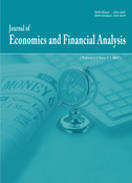URI: https://ojs.tripaledu.com/jefa/article/view/71/82
Are Frontier African Markets Inefficient or Adaptive? Application of Rolling GARCH Models
DOI: http://dx.doi.org/10.1991/jefa.v6i1.a49
Abstract
Keywords
JEL Classification
Full Text:
References
Abounoori, E., Shahrazi, M., & Rasekhi, S. (2012). An investigation of forex market efficiency based on detrended fluctuation analysis: A case study of Iran. Physica A: Statistical Mechanics and its Applications, 391(11), 3170-3179.
Abrahamson, A., & Creutz, S. (2018). Stock market anomalies: the day of the week effect. [online], Available at: https://diva-portal.org/smash/get/diva2:1212006/fulltext01.pdf. [Accessed on 03 March 2020].
Adaramola, A.O., & Adekanmbi, K.O. (2020). Day-of-the-week effect in Nigerian Stock Exchange: Adaptive Market Hypothesis Approach. Investment Management and Financial Innovations, 17(1), 97-108.
Akhter, T., & Yong, O. (2019). Adaptive market hypothesis and momentum effect: Evidence from Dhaka stock exchange. Cogent Economics & Finance, 7(1).
Alagidede, P., & Panagiotidis, T. (2009). Calendar anomalies in the Ghana stock exchange. Journal of Emerging Market Finance, 8(1), 1-23.
Borges, M.R. (2009). Calendar Effects in Stock Markets: Critique of Previous Methodologies and Recent Evidence in European Countries. Research Unit on Complexity and Economics, WP 37/2009/DE/UECE.
Brooks, C. (2019). Introductory economics for finance. Cambridge University Press: United Kingdom.
Brooks, C., & Persand, G. (2001). Seasonality in Southeast Asian stock markets: Some new Evidence on day-of-the-week effects. Applied Economics Letters, 8(3), 155-158.
Charfeddine, L., Khediri, K.B., Aye, G.C. & Gupta, R. (2018). Time-varying efficiency of developed and emerging bond markets: Evidence from long-spans of historical data. Physica A: Statistical Mechanics and its Applications, 505(C), 632–647.
Chatzitzisi, E., Fountas, S., & Panagiotidis, T. (2019). Another look at calendar anomalies. The Quarterly Review of Economics and Finance, 31, 1-34.
Fama, E.F. (1970). Random walks in stock market prices. Journal of Finance, 25(2), 383–417.
FTSE, Russell. (2014). Frontier markets accessing the next frontier. London Stock Exchange Group plc: London.
FTSE, Russell. (2019). FTSE classification of equity markets. London Stock Exchange Group plc: London.
Ferrouhi, E.M., Kharbouch, O., Aguenaou, S., & Naeem, M. (2021). Calendar anomalies in African stock markets. Cogent Economics & Finance, 9(1), 1-17, 1978639, DOI: 10.1080/23322039.2021.1978639
Ghazani, M.M., & Ebrahimi, S.B. (2019). Testing the adaptive market hypothesis as an evolutionary perspective on market efficiency: Evidence from the crude oil prices. Finance Research Letter, 30, 60-68.
Gökbulut, R.I., & Pekkaya, M. (2014). Estimating and forecasting volatility of financial markets using asymmetric GARCH models: An application on Turkish financial markets. International Journal of Economics and Finance, 6(4), 23-35.
Kalidas, S., Mbululu, D., & Chipeta, C. (2013). Changing Patterns in The Day-Of-The-Week Effects in African Stock Markets. International Business and Economic Research Journal, 12(10), 1157-1174.
Khursheed, A., Naheem, M., Ahmed, S., & Mustafa, F. (2020). Adaptive market hypothesis: An empirical analysis of time–varying market efficiency of cryptocurrencies. Cogent Economics and Finance, 8(1), 1-15. DOI: 10.1080/23322039.2020.1719574
Konstantinidis, A., Katarachia, A., Borovas, G., & Voutsa, M.E. (2012). From efficient market hypothesis to behavioural finance: Can behavioural finance be the new dominant model for investing? Scientific Bullentin – Economic Sciences, 11(2), 16-26.
Lakonishok, J., & Maberly, E. (1990). The weekend effect: Trading patterns of individual and institutional Investors. Journal of Finance, 45(1), 231-243.
Latif, M., Arshad, S., Fatima, M., & Farooq, S. (2011) Market efficiency, market anomalies, causes, evidences, and some behavioural aspects of market anomalies. Research Journal of Finance and Accounting, 2(9), 1-13.
Lo, A.W. (2004). The adaptive market hypothesis. Journal of Portfolio Management, 30(5), 15-29.
Lo, A.W. (2005). Reconciling efficient markets with behavioral finance: The adaptive market hypothesis. Journal of Investment Consulting, 7(2), 21-44.
Lo, A.W. (2017). Adaptive markets: Financial Evolution at the Speed of Thought. Princeton University Press: New Jersey.
Malkiel, B.G. (2003). The efficient market hypothesis and its critics. Journal of Economic Perspective, 17(1), 59-82.
Mazviona, B.W., Mah, G., Choga, I. (2021). Panel Analysis of Calendar Anomalies in the South African Stock Market. AUDOE, 17(3), 250-273.
Obalade, A.A. (2019). Adaptive Market Hypothesis and Calendar Anomalies in Selected African Stock Markets (Doctoral dissertation), University of KwaZulu-Natal, Durban, South Africa.
Obalade, A.A., & Muzindutsi, P.F. (2019a). Time-varying Calendar Anomaly in African Stock Markets: Application of GARCH Models. Journal of Global Business and Technology, 15(2), 1-16.
Obalade, A.A., & Muzindutsi P.F. (2019b). Calendar anomalies, market Regimes, and the adaptive market hypothesis in African stock markets. Central European Management Journal, 27(4), 71-94.
Onyuma, O.S. (2009). Day-of-the-week and month-of-the-year effect on the Kenyan stock market returns. Eastern Africa Social Science Research Review, 25(2), 53-74.
Pandey, F., & Samanta, A. (2016). An empirical analysis of January effect–evidence from Indian Market. International Journal of Innovative Research and Development, 5(7), 187-197.
Paradza, A. (2015). The efficient market hypothesis in developing economies: An investigation of the Monday effect and the January effect on the Zimbabwe stock exchange post of multi-currency system (2009-2013): The GARCH approach analysis (Master’s Thesis), Wits Business School, South Africa.
Ramirez, S.C., Arellano, P.L., & Rojas, O. (2015). Adaptive market efficiency of agricultural commodity futures contracts. Contaduría y Administración, 60, 389-401.
Rosini, L., & Shenai, V. (2020). Stock returns and Calendar Anomalies on the London Stok Exchange in the dynamic perspective of the adaptive market hypothesis: A study of FTSE 100& FTSE 250 indices over a ten-year periods. Quantitative Finance and Economics, 4(1), 121-141.
Tachiwou, A.M. (2010). Day-of-the-week-Effects in West African regional stock market. International Journal of Economics and Finance, 2(4), 167-173.
Urquhart, A., & McGroarty, F. (2014). Calendar effects, market conditions and the Adaptive Market Hypothesis: Evidence from long-run U.S. data. International Review of Financial Analysis, 35, 154-166.
Wong, W., Agarwal, A., & Wong, N. (2006). The Disappearing Calendar Anomalies in the Singapore Stock Market. Labore Journal of Economics, 11(2), 123-139.

This work is licensed under a Creative Commons Attribution-NonCommercial-NoDerivatives 4.0 International License.


